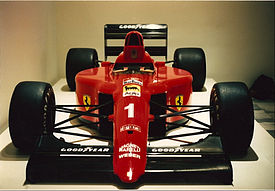Ferrari 641
 |
|||||||||
| Category | Formula One | ||||||||
|---|---|---|---|---|---|---|---|---|---|
| Constructor | Ferrari | ||||||||
| Designer(s) |
Enrique Scalabroni Steve Nichols |
||||||||
| Predecessor | 640 | ||||||||
| Successor | 642 | ||||||||
| Technical specifications | |||||||||
| Chassis | Kevlar and Carbon fibre composite monocoque | ||||||||
| Suspension (front) | Double wishbones, push-rod actuated torsion bar springs and telescopic shock absorbers, anti-roll bar | ||||||||
| Suspension (rear) | Double wishbones, push rod actuated coil springs over telescopic shock absorbers, anti-roll bar | ||||||||
| Engine | Ferrari Tipo 036 3,498 cc (213.5 cu in), 65° V12, NA, mid-engine, longitudinally mounted | ||||||||
| Transmission | Ferrari 7-speed semi-automatic | ||||||||
| Fuel | Agip | ||||||||
| Tyres | Goodyear | ||||||||
| Competition history | |||||||||
| Notable entrants | Scuderia Ferrari SpA | ||||||||
| Notable drivers | 1. 2. |
||||||||
| Debut | 1990 United States Grand Prix | ||||||||
|
|||||||||
| Constructors' Championships | 0 | ||||||||
| Drivers' Championships | 0 | ||||||||
The Ferrari 641 (also known as the Ferrari F1-90) was the Formula One racing car with which the Ferrari team competed in the 1990 Formula One season.
The 641 was a developed version of its predecessor, the 1989 Ferrari 640, designed by John Barnard. The updated 641 design was overseen by former McLaren designer Steve Nichols after Barnard left Ferrari to join the Benetton team. The car was powered by a 3.5 litre V12 engine, first with the type 036, and later in San Marino with the updated 037. The V12 was rated at 680 bhp (507 kW; 689 PS), only slightly down on the 690 bhp (515 kW; 700 PS) Honda V10 engines used by McLaren.
The car scored 6 wins in the 1990 season (Prost 5 wins, Mansell 1 win). Incorporating the semi-automatic gearbox developed during the previous season, the car was seen to be technically advanced. The aerodynamics were reworked and the chassis given a slightly longer wheelbase than its predecessor. Ferrari's major coup was signing reigning World Champion Alain Prost from McLaren to partner Nigel Mansell. As such, Nichols designed the car with Prost's smooth driving style in mind. A variable inlet trumpet system on the engine was tested throughout the season, but did not become standard equipment.
Prost worked hard on improving the reliability of the gearbox and also worked behind the scenes to bring the whole Ferrari team closer together. Prost's development work helped the 641 chassis to be extremely fast and competitive, and he scored five wins, including a remarkable victory from 13th place on the grid in Mexico, and challenged his nemesis Ayrton Senna for the championship. Although the car occasionally struggled in qualifying, it appeared to have the edge on the McLarens in race trim, particularly at high speed circuits. However, the famous collision between the two drivers at the Japanese Grand Prix sealed the Drivers' Championship for Senna and the Constructors' Championship for McLaren. Prost finished runner-up in the championship and Mansell finished 5th and scored 1 win, including an excellent performance in his last race for Ferrari at Adelaide, where he finished 2nd and almost won that race from Nelson Piquet and his Benetton-Ford. It would be another seven years before Ferrari would challenge for either championship again.
...
Wikipedia
